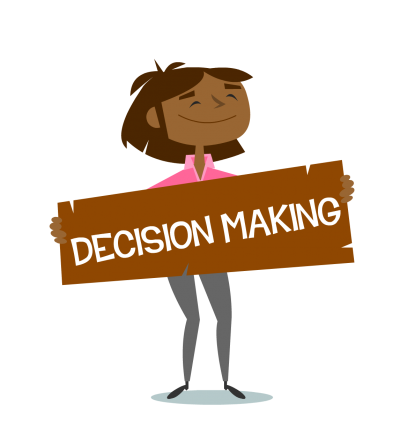Congratulations, you have taken careful steps to make the decision that is right for you. You got clear on your values, utilized effective informational and creative strategies, followed systems, and took action. Now what?
Depending on your goal, whether it is about improving your decision-making skills, enhancing your current situation by reversing the decision, or just enjoying your peace of mind, you may consider the following:
1. Reflect. If you are interested in improving your decision-making abilities, carve out the necessary time to reflect. After the choice, monitor it. What is working? What approaches, criteria, metrics, and systems did you use that were successful? What did you overlook and may want to include next time you choose? Mark Twain described the complicated nature of decision-making as follows: “Good decisions come from experience, but experience comes from making bad decisions.” This is not to say that the only way to become a great decision-maker is to make a ton of mistakes; it just means that it is important to keep past decisions in the front of your mind to capitalize on the learning moment.
You can also do long-term reflection. You can do an annual review by asking – what was your best and worst decision you made last year? How do you know they were your best or worst? To answer these questions, most people follow a concept that Annie Duke describes as “resulting” – a decision was good if the outcome was good, but that is an incomplete way to evaluate. Just because you got home safely after drunk driving does not mean you made a good choice to jeopardize your life and the lives of others. Instead, what you can do is map out a few other choices you could have made and then evaluate them against the choice that you actually made. What did you wish you would have known at the time, how could you have found out that information, what will you do differently next time? Asking these kinds of questions will improve your decision-making processes.
2. Choose to reverse a big decision. We think that when we make a selection, we have lost all agency, but we can always choose to course-correct if we have given it enough time and decided with all our minds and hearts that it is not right for us at this time. Decisions are not permanent sentences and when we can get creative about having the confidence to tweak our choices or even reverse them, we can attain more happiness.
3. Enjoy the peace of mind of making a small, lasting decision. Making some irrevocable determinations can bring more happiness.Daniel Gilbert ran a study where at the end of his photography course, students had to choose which photo of the many to keep. Group A was told that if they changed their mind later, they could swap the photo. Group B was told their choice was final. You would think that many people were happy in the first group because they preserved their options, knowing they could always trade their photo. The study found that when people made an irrevocable decision, they rationalized it easily move forward. Once something is gone forever, the mind gets to work, figuring out why what it has is better than what it lost. But when a decision is irrevocable, you ruminate and think, do I like this photograph, maybe the other one goes better in my living room, I should take it back and upgrade. When it comes to smaller decisions, set yourself up for ones that do not leave you with an out, at the end of the day, it is just a picture.
Depending on your goal, there are things you can do after a decision is made. If you are trying to be a better decision-maker, you can reflect on your choice and monitor how it works out and what you did well in the process leading up to the decision. If you are aiming for happiness, you may choose to alter or reverse the selection. If you are interested in attaining peace of mind relating to small decisions, you may want to make irrevocable ones.
Quote of the day: “All life is an experiment. The more experiments you make, the better.” -Ralph Waldo Emerson
Q: How do you reflect on your decisions once you made them to improve your future decisions? What was your best and worst decision of last year? Comment and share below, we would love to hear from you!
[The next blog in this series 8/8 will focus on decision-making in teams.]
As a leadership development and executive coach, I work with leaders to help them make hard decisions and reflect on their process, contact me to explore this topic further.


